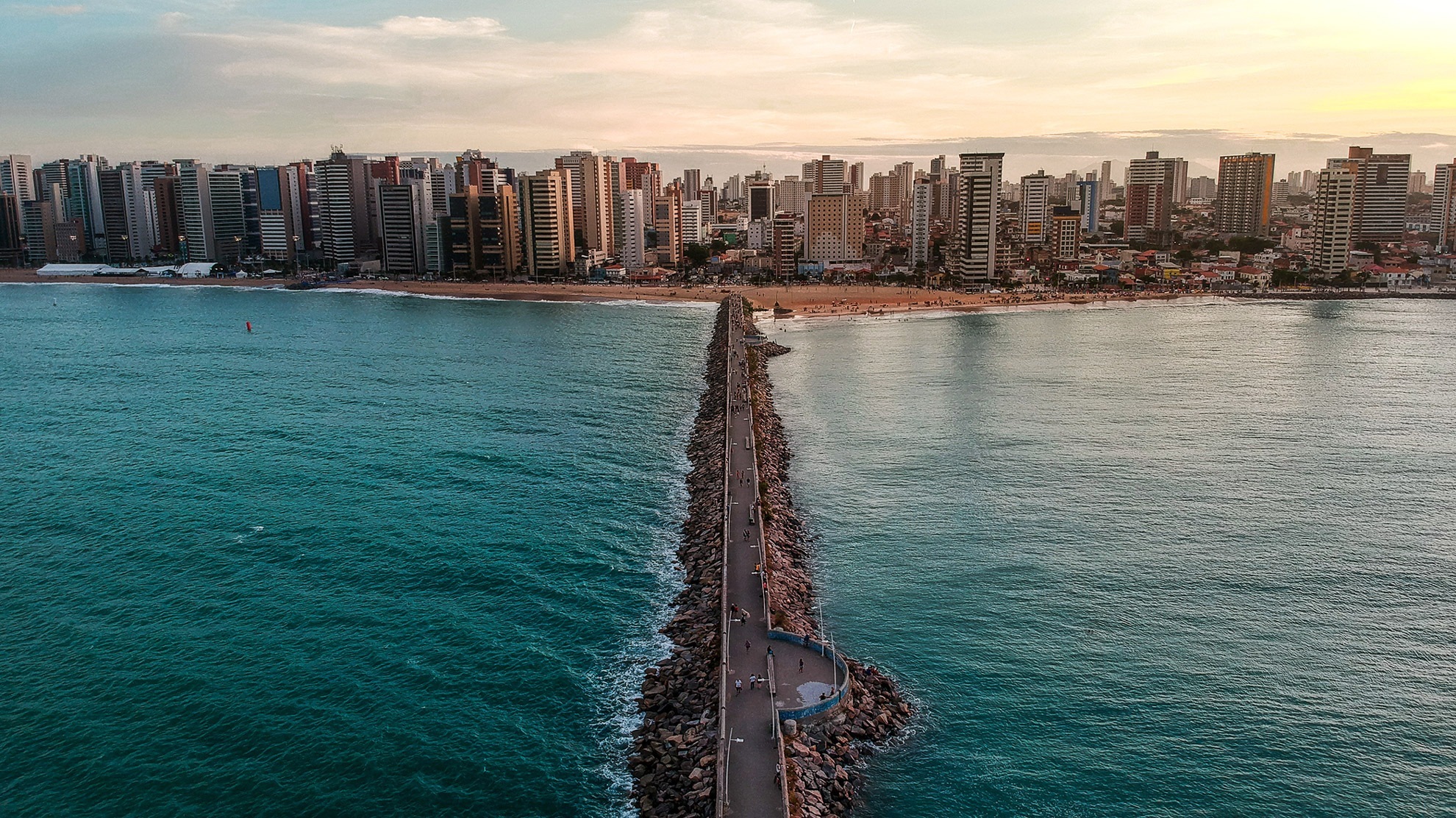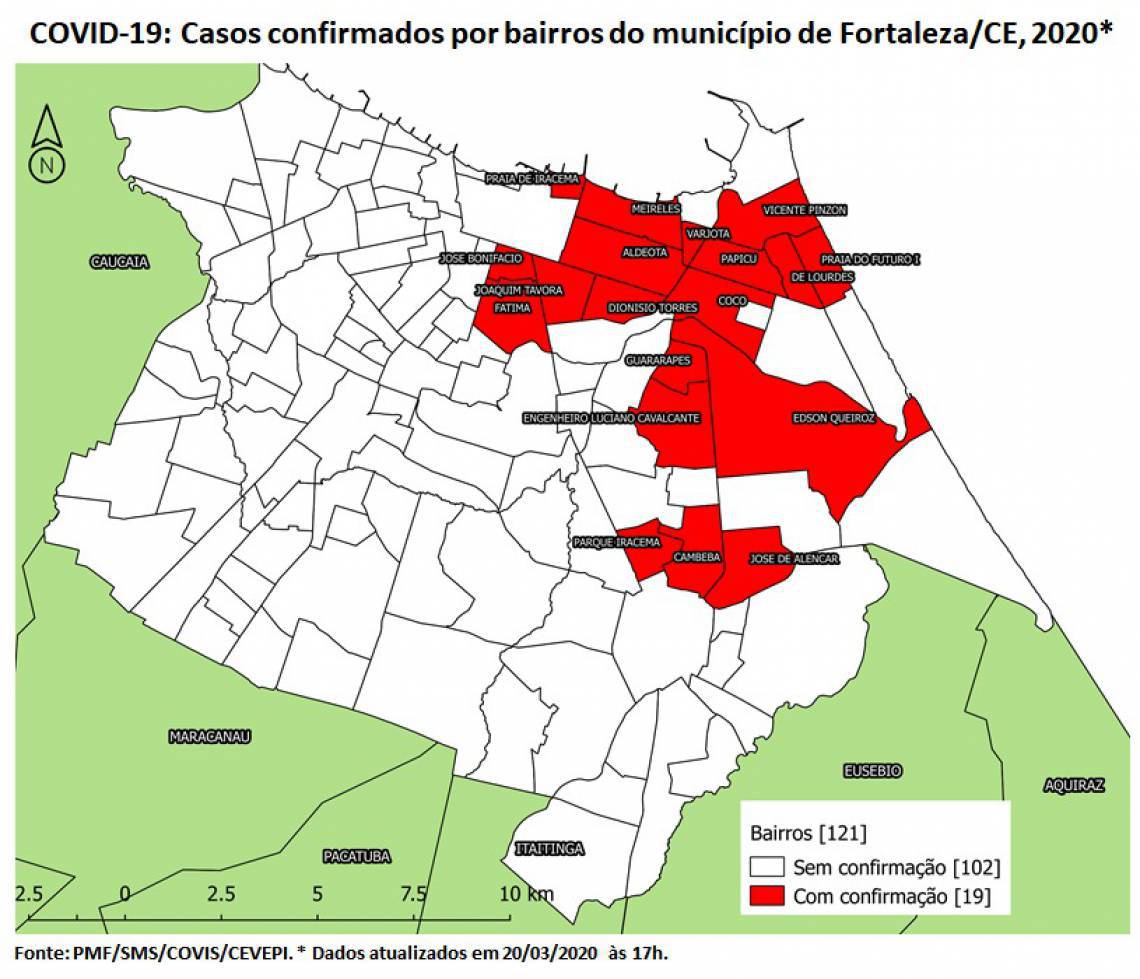RIO DE JANEIRO, BRAZIL – The incidence of flights and the flow of foreigners in the routine of Ceará state attracted attention, as of March 15th, to the problem that would be confirmed less than a month later: the state became the third highest in Brazil in terms of the number of cases of Covid-19, which originated in China and spread throughout the world as of February.
The gateway to the disease, Fortaleza is the Brazilian capital with the highest rate of new infections, with 34.7 per 100,000 inhabitants. There are an average of two deaths attributed to the disease per day in the state. As a rearguard, the public health network is preparing for more acute stages of contagion, with a peak expected for the last week of April.

Among the main measures are the erection of an emergency hospital in a football stadium, the setting up of field hospitals and the temporary conversion of hotel rooms into beds. There is also a strategy still little used in the remainder of the country: the requisitioning of beds and equipment in the private hospital network.
During Holy Week, the state government’s message at one of the country’s tourist poles is to reinforce social isolation, despite the calls from traders and industry to reopen.
The Covid-19 virus, which entered the state through Fortaleza, home to the country’s fifth largest airport in terms of international flights, is found in over 90 percent of the capital’s neighborhoods and in 45 of the state’s 184 municipalities.
By 5 PM on Wednesday, 1,374 confirmed cases and 53 deaths had been recorded by the State Health Secretariat (SESA), placing Ceará among the three states that have exceeded the mark of a thousand infections – São Paulo and Rio de Janeiro head the list.
According to the State Health Secretary, Carlos Roberto Sobrinho (Cabeto), there are an average of 300 admissions per day for Covid-19, half in intensive care units (ICUs), and 90 discharges.
“We need to increase isolation. We discussed potential restrictive actions with the Municipal Guard and police, but we don’t want it to be needed,” he said. According to Cabeto, restriction is key in the battle of time. The slower the chain of contagion in the state, the more time there will be to structure the service network.
Beds in the private network
In order to attempt to expedite care, the State Government requisitioned – i.e. took for emergency use – the privately owned Leonardo da Vinci Hospital, which has 230 beds and an ICU. The bulding had been closed for 13 years and had to be remodeled to accommodate the patients.
On Monday, the occupation rate in the unit was 15.7 percent. On Wednesday, it was 49.46 percent at 5 PM. The plan is that by the end of the week the hospital will be fully operational.
In addition, other hospitals, facilities and equipment were requisitioned by the government for use by the state network: the private and deactivated Accident Emergency Room, the private and operational Batista Memorial Hospital and the Center for Drug Research and Development (NPDM), of the Federal University of Ceará.
In all three cases, the rationale is the same: “unavoidable need to expand the capacity of care in the state public network”. According to the state ordinance 2020-342, requisition will last as long as there is need.
The Secretariat of Health will inventory, evaluate the items, maintain, make needed repairs and compensate the parties, but fails to specify the amount in the document. Through the partnership with the NPDM, it will be possible to increase the ICU beds of Hospital Leonardo da Vinci by 34.
In parallel, field hospitals are being set up in the parking lots of the Carlos Alberto Studart, César Cals and Fortaleza General Hospitals, with 150 new beds among the three.
For the total increase of more than 600 beds, the State is investing R$245 million. In the interior, the strategy is to structure a reference hospital in each of Ceará’s five health regions.
Another measure to meet the increase in demand is the establishment of an emergency hospital in the Presidente Vargas (PV) soccer stadium.
The total cost is R$80 million and is under the responsibility of the City of Fortaleza. According to the city’s secretary of government, Samuel Dias, the spending on the physical part is five percent of the total value and does not include the purchase of equipment, supplies and staff expenses.
The PV option was criticized because it does not prioritize the repurposing of existing facilities, but rather the establishment of a temporary facility. Mayor Roberto Cláudio justifies the choice by concentrating patients in one space. As there will be 204 beds and the option of expanding to add another 100, the mayor believes that no existing facility would be able to withstand such an increase.

In the main private network centers in Fortaleza, there is also activity. The Unimed Hospital set up a field facility in its parking lot, with 44 beds located on 720 square meters.
According to the hospital’s press office, there has not yet been any need to use the beds, set up in one week. Of the 336 beds, 100 will be for Covid-19 patients and 22 for ICUs. Yesterday, the HapVida System announced that it is assessing hotel rentals in several cities in the country.
Hub and tourism industry
In Fortaleza, there are advanced negotiations with the Sonata Hotel, on Iracema Beach. In case of need, the hotel would accommodate patients with other illnesses, to unburden the chain in attending Covid-19.
Vicente de Paiva Neto, of the supervisory board of the Brazilian Association of the Hotel Industry (ABIH), states that the tourism sector is working with 52 other areas and is among those most affected by isolation. However, it seeks other ways to contribute.
The Meridional Hotel, in the center of Fortaleza, is hosting health professionals at cost price. “It is a humanitarian choice,” says Neto.
The flow of the disease in Ceará is, in part, a consequence of the successful strategy of the State’s tourist integration in recent years. Since 2018, the Fortaleza Air Hub, which expanded the capital’s airport, has improved Ceará’s connections with other countries.
According to the State Secretary of Tourism, there are direct flights to Paris, Amsterdam, Miami and Orlando by Air France/KLM/GOL; and to Madrid by Air Europa. In addition to the hub, there are direct flights to Lisbon, Buenos Aires, Cayenne and Isle of Sal in Cabo Verde.
There were 40 weekly international flights until the coronavirus intensified and all flights were stopped.
According to data from the National Civil Aviation Agency (ANAC), from 2018 to 2019 Fortaleza Airport rose from ninth to fifth place among the airports that had the most paid passengers on international flights, a virtual tie with the flow of the capital, Brasília.

